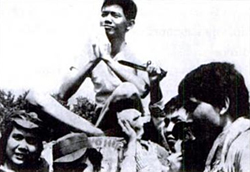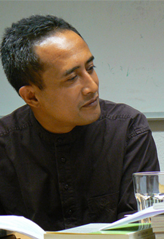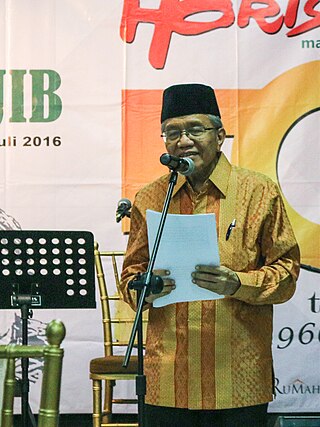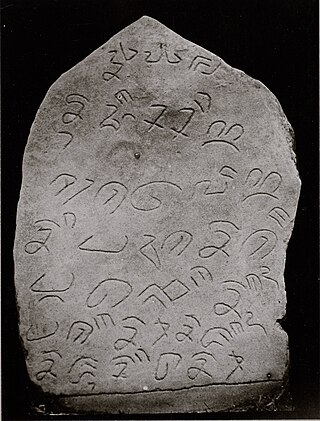
Soe Hok Gie was a Chinese Indonesian activist who opposed the successive dictatorships of Presidents Sukarno and Suharto.

Agus R. Sarjono is an Indonesian poet and author. In 1988, he graduated from Department of Indonesian Literature of IKIP Bandung, and then finished his postgraduate program in Universitas Indonesia at the faculty of literature and cultural studies in 2002.
Ahmadun Yosi Herfanda, is an Indonesian journalist and poet. His name is also written as Ahmadun YH, Ahmadun Y. Herfanda, Ahmadun Herfanda, or AYH (ayeha). Ahmadun's poetry focuses on social and religious themes and is informed by Sufism. He is a reporter and arts editor at the daily newspaper Republika. Now he is known as a famous Indonesian poet and writer.

Indonesian literature is a term grouping various genres of South-East Asian literature.

Taufiq Ismail is an Indonesian poet, activist and the editor of the monthly literary magazine Horison. Ismail figured prominently in Indonesian literature of the post-Sukarno period and is considered one of the pioneers of the "Generation of '66". He completed his education at the University of Indonesia. Before becoming active as a writer, he taught at the Institut Pertanian Bogor. In 1963, he signed the "Cultural Manifesto" as a document that opposed linking art to politics. This cost him his teaching position at the Institut.
Udo Z. Karzi is an Indonesian writer.

Ajip Rosidi was an Indonesian poet and short story writer. As of 1983 he had published 326 works in 22 different magazines.

Toeti Heraty was an Indonesian poet. She has been singled out as the "only woman amongst the leading contemporary Indonesian poets".
Ida Ayu Oka Rusmini, known as Oka Rusmini, is an Indonesian poet and novelist. She is a recipient of the S.E.A. Write Award.
Harry Aveling is an Australian scholar, translator and teacher. He specialises in Indonesian and Malaysian literature, and Translation Studies. He received the degrees of Doctor of Philosophy in Malay Studies from the National University of Singapore and Doctor of Creative Arts (DCA) from the University of Technology, Sydney. Besides his academic writing, he has translated extensively from Indonesian and Malay, from Vietnamese Francophone literature, and also co-translated from Hindi. He has been awarded the Anugerah Pengembangan Sastra for his translation work. Aveling has two sons, a daughter and five granddaughters.
Putu Oka Sukanta is a versatile Indonesian author of fiction and poetry. He wrote poetry, short stories and novels while still in Bali and after he moved to Yogyakarta and Jakarta. From 1966, during the New Order, he was imprisoned without trial as an alleged member of LEKRA. After his release in 1976, he has come to be known as a writer, journalist and an expert in the field of traditional medicine.
Darmanto Jatman was an Indonesian poet and writer. He was an Emeritus Professor at the Faculty of Psychology, Diponegoro University (UNDIP), Semarang. He was known as a humanist, philosopher and poet of Indonesia. He gave birth to the establishment of the Faculty of Psychology at UNDIP and became the first professor in the faculty. On 27 July 2007, Susilo Wibowo of UNDIP gave him the title of Professor, exactly a month before he retired, so that he was immediately given the title of Emeritus Professor.

Muhammad Ainun Nadjib, best known as Emha Ainun Nadjib or Cak Nun/Mbah Nun, is an Indonesian poet, essayist, kyai, ulama, and humanist. Born in Jombang, East Java, Nadjib began writing poetry while living in Yogyakarta, publishing his first collection in 1976. He became one of the city's predominant poets by the late 1980s, and by then had also began writing essays. He is the leader of the Kiai Kanjeng group, which stages dramas and musical performances on religious themes.
C. Soebakdi Soemanto was an Indonesian writer, poet, playwright, editor, and professor at the Faculty of Cultural Sciences, Gadjah Mada University (UGM), Yogyakarta.

Deknong Kemalawati is one of the leading poetess of modern Indonesia, chairman of the Art Council Banda Aceh, winner of the Literary Prize of the Government of Aceh.

Diah Hadaning was an Indonesian writer. Among friends she is known as Diha.

Dimas Arika Mihardja was an Indonesian poet and scholar, essayist. He wrote under a pseudonym, the real name is Sudaryono. Among friends he was called as Dam.

Raja Rajeswari Setha Raman is a Malaysian poet and translator. Tamil by ethnicity. She is also a lecturer of the Teacher Education Institute, Malay Language Campus.
Damiri Mahmud was an Indonesian writer. He also wrote poetry and various articles for newspapers and magazines. His writings in the form of cultural, political, and religious articles, appeared in various dailies and magazines in Indonesia and Malaysia, among others: Buana News, Pelita, Kompas, Republika, People's Thoughts, Analysis, Alert, Free, People's Mind, Lampung Post, Media Indonesia, Community Flag, Sovereign, Horison, Base, Council for Literature and Daily News (Malaysia).

Old Sundanese is the earliest recorded stage of the Sundanese language which is spoken in the western part of Java, Indonesia. The evidence is recorded in inscriptions from around the 12th to 14th centuries and ancient palm-leaf manuscripts from the 15th to 17th centuries AD. Old Sundanese is no longer used today, but has developed into its descendant, modern Sundanese.












